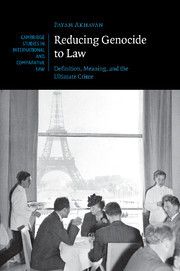Description
Reducing Genocide to Law
Definition, Meaning, and the Ultimate Crime
Cambridge Studies in International and Comparative Law Series
Author: Akhavan Payam
Why is genocide the 'ultimate crime' and does this distinction make any difference in confronting evil?
Language: English
Subject for Reducing Genocide to Law:
Approximative price 34.17 €
In Print (Delivery period: 14 days).
Add to cart
Reducing Genocide to Law
Publication date: 01-2015
Support: Print on demand
Publication date: 01-2015
Support: Print on demand
Approximative price 101.82 €
In Print (Delivery period: 14 days).
Add to cart
Reducing genocide to law: definition, meaning, and the ultimate crime
Publication date: 01-2012
210 p. · 15.8x23.4 cm · Hardback
Publication date: 01-2012
210 p. · 15.8x23.4 cm · Hardback
Description
/li>Contents
/li>Biography
/li>
Could the prevailing view that genocide is the ultimate crime be wrong? Is it possible that it is actually on an equal footing with war crimes and crimes against humanity? Is the power of the word genocide derived from something other than jurisprudence? And why should a hierarchical abstraction assume such importance in conferring meaning on suffering and injustice? Could reducing a reality that is beyond reason and words into a fixed category undermine the very progress and justice that such labelling purports to achieve? For some, these questions may border on the international law equivalent of blasphemy. This original and daring book, written by a renowned scholar and practitioner who was the first Legal Advisor to the UN Prosecutor at The Hague, is a probing reflection on empathy and our faith in global justice.
1. The power of a word; 2. The taxonomy of crimes; 3. The core elements of international crimes; 4. A hierarchy of international crimes?; 5. Naming the nameless crime; 6. Who owns 'genocide'?; 7. Contesting 'genocide' in jurisprudence; 8. Silence, empathy, and the potentialities of jurisprudence.
Payam Akhavan is Professor of International Law at McGill University in Montreal, Canada. He was the first Legal Advisor to the Prosecutor's Office of the International Criminal Tribunals for the former Yugoslavia and Rwanda at The Hague (1994–2000) and has served with the United Nations in Cambodia, East Timor and Guatemala. He is also the author of the Report on the Work of the Office of the Special Advisor of the United Nations Secretary-General on the Prevention of Genocide (2005), has served as Chairman of the Global Conference on the Prevention of Genocide (2007) and is Co-Producer of the documentary film 'Genos.Cide: The Great Challenge' (2009).
© 2024 LAVOISIER S.A.S.
These books may interest you

Genocide and Human Rights 48.88 €

Genocide and Human Rights 160.25 €

Global Crime and Justice 329.31 €

